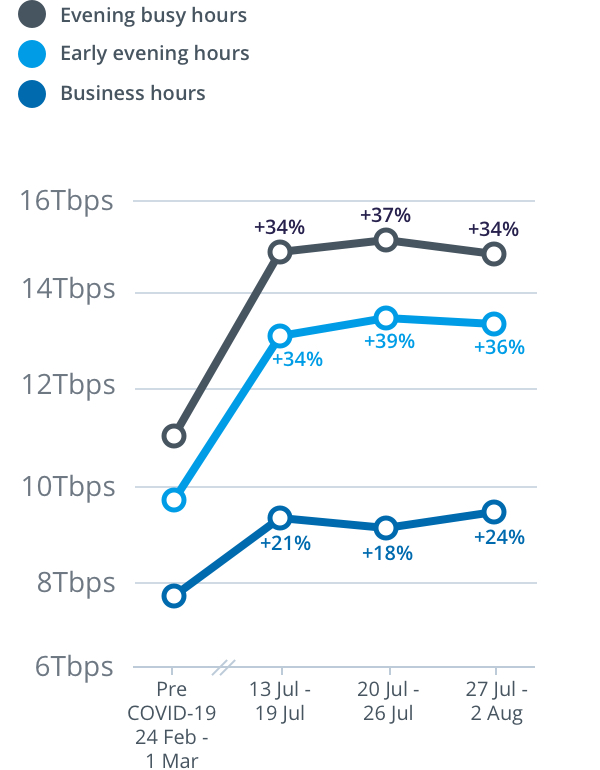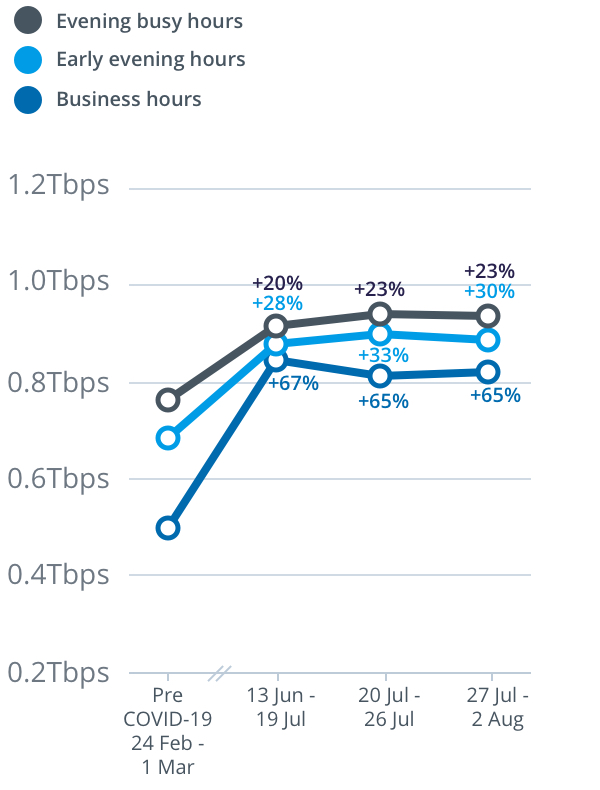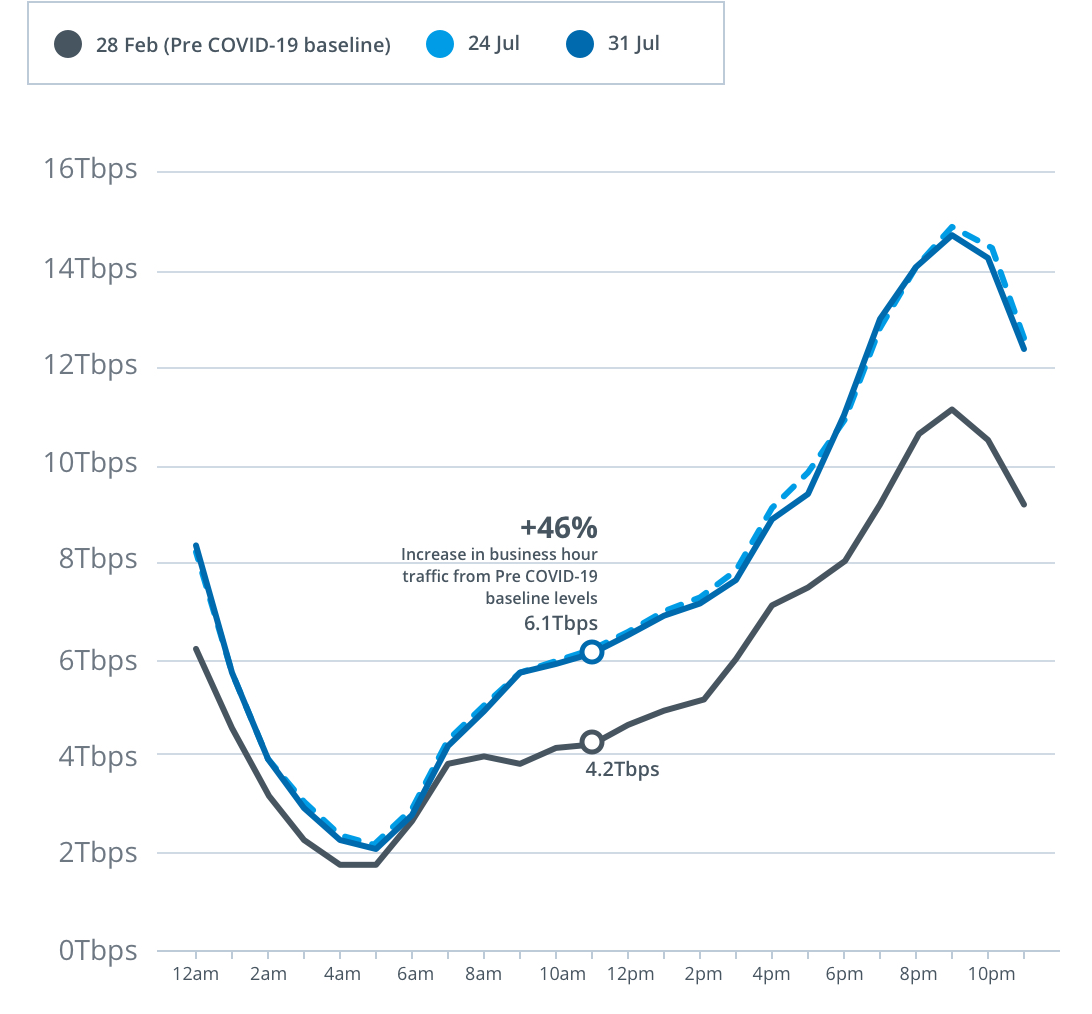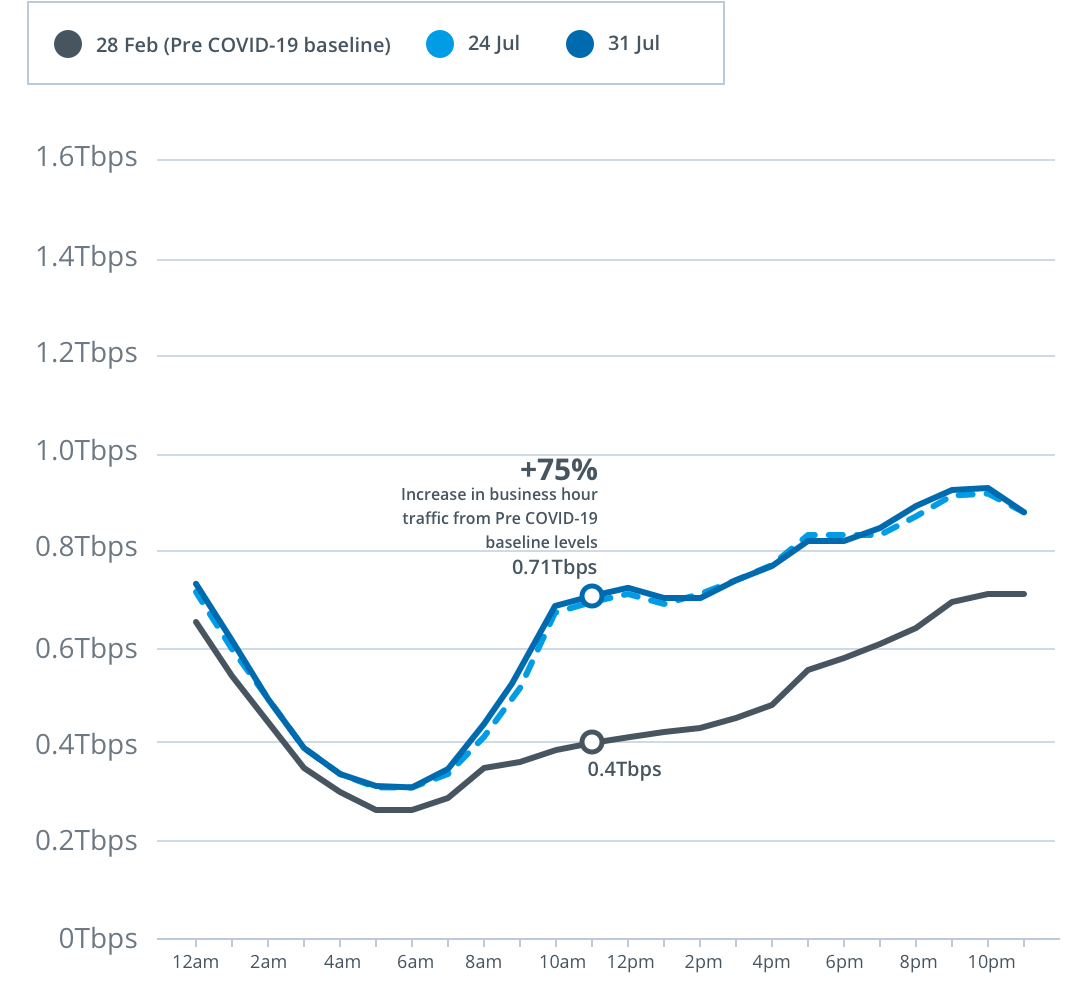Australian Broadband Data Demand: data demand on the nbn continues to reflect high network usage
- Weekly download throughput peak of 14.8 Terabits per second (Tbps) recorded on Saturday, 1 August during the evening busy hours
- Weekly upload throughput peak of 0.94 Tbps recorded on Sunday, 2 August during the evening busy hours
The nbn’s main wholesale access service continues to support strong data demand, according to new figures revealed in the latest Australian Broadband Data Demand report.
Factors contributing to data demand on the nbn™ network include organic growth in usage across the customer base as well as changed internet usage habits attributable to COVID-19 response measures.
For the week from Monday, 27 July to Sunday, 2 August, peak download throughput (the measure of data flowing through the nbn™ network) during the busy evening period increased by 34 per cent to 14.8 Terabits per second (Tbps) on the main nbn wholesale service, compared to the last week of February (which nbn measures as its normal pre-COVID-19 baseline).
Peak download throughput during the same week also increased during daytime business hours, up 24 per cent to 9.6Tbps, and early evening hours up 36 per cent to 13.4Tbps, compared to the pre-COVID-19 baseline.
Australian Broadband Data Demand is a weekly report into the peak throughput recorded in a week during daytime business hours, early evening hours and busy evening hours.
Downstream network usage

Upstream network usage

Downstream network usage over 24 hours

Upstream network usage over 24 hours

The Australian Broadband Data Demand report is updated weekly on nbn’s Transparency dashboard at: www.nbn.com.au/updates
For tips on how to make the most of your nbn connection and to learn more on what NBN Co is doing to support Australia through COVID-19, please visit: www.nbnco.com.au/campaigns/covid-19
Notes to editor:
- These metrics represent the upstream/downstream throughput peak each week, across the following three distinct periods:
o Business hours - Monday to Friday 8am to 4:59pm
o Early evening hours - Monday to Sunday 5pm to 7:59pm
o Evening busy hours - Monday to Sunday 8pm to 11:59pm
- For Business Hours, the peak is determined by taking the highest downstream throughput for our TC-4 service from the busiest 15-minute increment for downstream throughput, and from the busiest 30-minute increment for upstream, between Monday to Friday. The Early Evening Hours and Busy Evening Hours figures are recorded using the same methodology, but over a seven day period.
- TC-4 is nbn’s standard wholesale broadband service that is designed primarily for general internet and standard data services across all access technologies.
- NBN Co considers the throughput peak metric for our TC-4 service as the most appropriate measure for growth in data flowing through the network as it shows when network use is at its highest in each defined period in a week for our wholesale access service most used for residential broadband services.
- This graph shows TC-4 usage (measured in terabits per second for both upstream and downstream) over a 24 hour period (using Australian Eastern Standard/Daylight time on the dates shown in the key). It compares the results from those two dates against a corresponding 24 hour period from nbn’s pre-COVID-19 baseline on 28 February 2020 (the last week of February). Each marker on the x axis represents an hour period in the day. The y axis shows, for each of the 60 minute periods in that 24 hour period:
o The downstream throughput measure calculated by recording the highest downstream throughput for our TC-4 service from the busiest 15 minute increment in that 60 minute period.
o The upstream throughput measure calculated by recording the highest upstream throughput for our TC-4 service from the busiest 30 minute increment in that 60 minute period.
- The terabits per second (Tbps) value is rounded to one decimal place. The percentage increase is rounded to the nearest whole number.
1 Regardless of the retail service customers purchase, the actual wholesale speeds delivered by the nbn 1000 wholesale speed tier product will be less than 1Gbps due to equipment and network limitations. Reference to speeds are not end user speeds; they are wholesale layer 2 peak information rate bandwidth provided to the RSP.
2 For the HFC Home Ultrafast bandwidth profile, the Layer 2 wholesale downstream service will be configured at the Layer 2 network management to a Maximum Sustained Information Rate of 750Mbps with the potential to burst up to a maximum of 990Mbps (depending on but not limited to, the Frame Size and line speed capability - see note 2 above) at potential burst durations between 1 to 50 seconds at least once a day (see section 2.2.2.5 of the nbn™ Ethernet Product Technical Specification).
3 nbn provides wholesale services to phone and internet providers. nbn™ wholesale speed tiers available to providers vary depending on the access technology in an end customer’s area. End customer experience, including the speeds actually achieved over the nbn™ broadband access network, depends on the nbn™ access network technology and configuration over which services are delivered to their premises, whether they are using the internet during the busy period, and some factors outside of nbn’s control (like their equipment quality, software, chosen broadband plan, signal reception, or how their provider designs its network).
